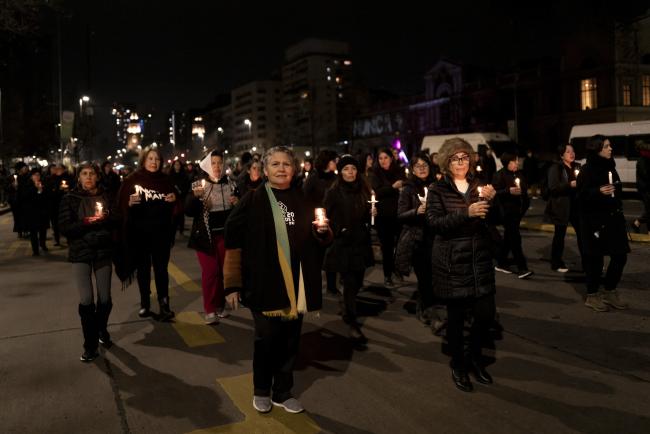
SANTIAGO DE CHILE. On the eve of the 50th anniversary of the coup that ousted socialist President Salvador Allende and his Popular Unity government, thousands of Chileans took to the streets in Santiago to honor the victims of the dictatorship and demand justice. Demonstrators carried photos of the disappeared, party banners, and the Mapuche flag as they marched from the La Moneda presidential palace to the Cemeterio General in an annual procession known as la romería.
Amanda Eliana Vega Manteluna, 24, marched silently holding hands with one of her friends, holding a picture of her missing uncle, disappeared in August 1976. “His wife, my aunt, died waiting for justice,” she said, tears in her eyes. “So we come here, every year, holding the pictures she used to hold in every march.”
“We’re not forgetting what happened,” said Vega Manteluna, who participated in Chile’s historic 2019 protests and the youth movement that helped propel President Gabriel Boric and his coalition into office. “It’s present, it’s sticking with us.”
On September 11, 1973, the military bombed La Moneda and Allende killed himself inside the palace as troops attacked. The CIA-backed assault installed a military junta led by General Augusto Pinochet that wouldn’t cease until March 11, 1990, after a 1988 plebiscite in which citizens chose to return to democracy.
The dictatorship disappeared and murdered over 3,000 people and tortured 40,000. Estimates of those who fled the country for political reasons range from 200,000 to more than 1 million.
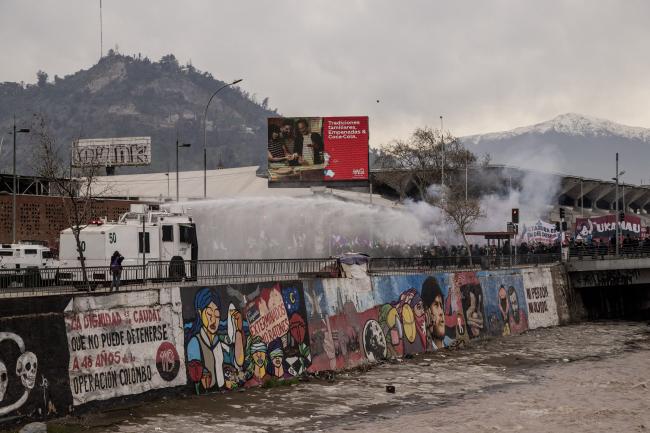
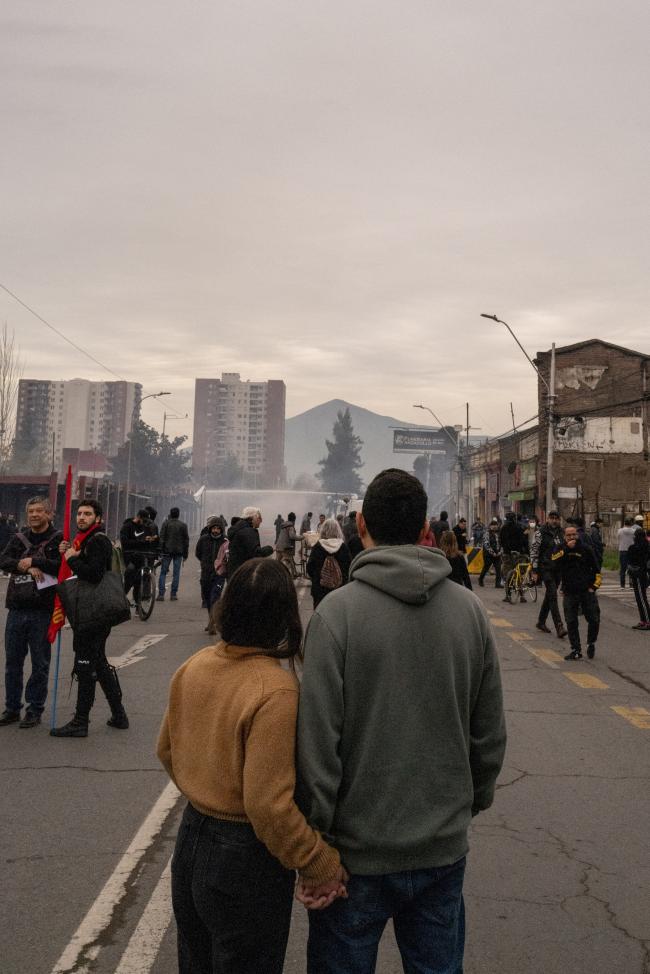
Half a century later, Chileans still struggle to search for truth and justice, while resurgent denialism and a longstanding lack of memory policies hinder their efforts. Although Vega Manteluna acknowledges that the Boric administration has made several strides in the human rights field, she believes there’s still a long way to go. “The torturers are dying in freedom,” she said, “taking the truth of what they did to our relatives to their graves.”
Also among the marchers was Sergio Muñoz, 79, a former member of the Socialist Party of Chile. Muñoz was exiled to Argentina, where he became a victim of state terrorism amid the regional U.S.-backed Operation Condor that targeted leftists across South America. Years later, he got to testify against his torturers in Argentina. But his comrades in Chilewhere systemic impunity has blocked access to truth and justice and prevented trials against the perpetrators of human rights crimeshave not had the same opportunity. It was only last month that President Boric announced a National Search Plan to find the remains of those forcibly disappeared during the dictatorship.
On September 10, Muñoz stood on a street corner in Santiago and watched the march go by. “There is still room for justice,” he said. “That’s why I come here every year.”
A few blocks behind Muñoz, Chile’s notorious Carabineros police force clashed with protesters dressed in all-black outfits, their faces covered, throwing rocks at police vehicles. Police launched tear gas and fired water cannons on the demonstrators. “This [brutality] only gives me more reasons to carry out my claims,” said a demonstrator marching with the Izquierda Cristiana movement.
The procession was mostly peaceful, with chants for justice blending with a sense of mourning while walking towards the cemetery. Among demonstrators there were conflicting opinions about whether the balaclava-clad protesters were infiltrators seeking to disturb the commemorations or anarchists employing radical tactics.
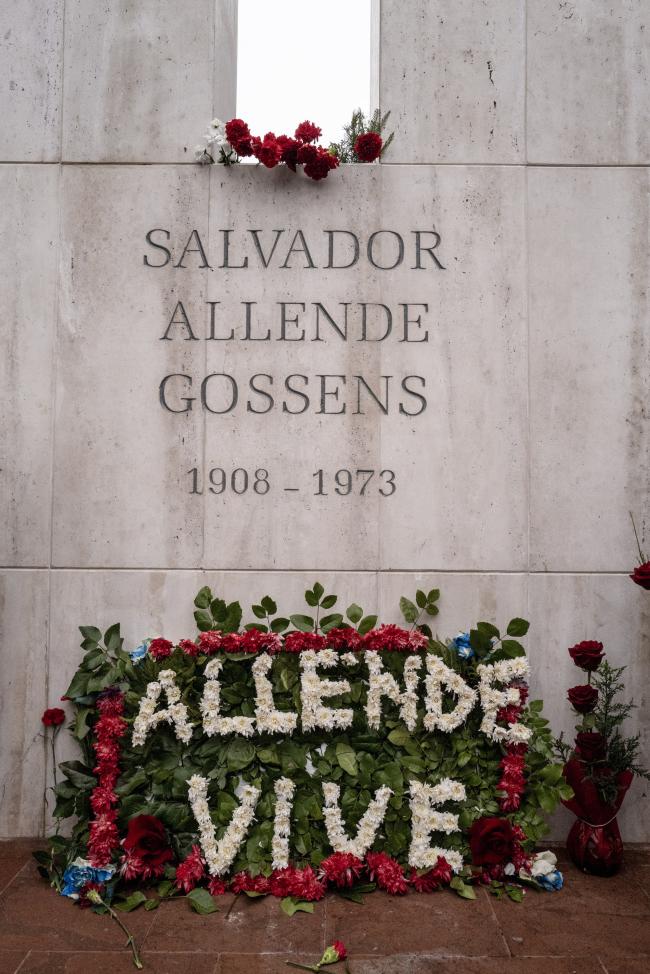
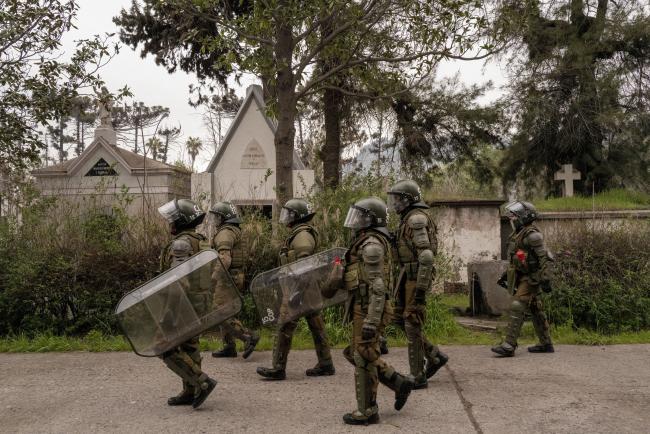
A Responsibility to Repair
The 50th anniversary of the coup comes on the heels of turbulent years in Chile. In 2019, mass protests against neoliberal policies and deep inequalitylegacies of the Pinochet regimesparked an “awakening” and a national debate on the writing of a new constitution to replace the Pinochet-era charter. In 2021, Gabriel Boric was elected president in a race against far-right Pinochet supporter José Antonio Kast. And last year, just days ahead of the September 11 commemorations, Chileans rejected the much-anticipated draft new constitution in a plebiscite that was strongly influenced by a right-wing campaign of misinformation and fear-mongering. The image of and trust in the Boric government dropped.
During an address at La Moneda on the morning of September 10, President Boric depicted Allende as “a referent for those of us who believe in a better country.” Boric’s government, which entered office with promises of delivering on popular demands, has struggled to carry out significant reforms. Among the challenges his administration has faced is the rise of far-right movements, including a strong contingent in Congress.
A 2023 poll by Mori finds that 36 percent of the population believes that Pinochet’s coup was justified, up 20 percentage points from 20 years ago. “In 2023,” the Mori report states, “Pinochetismo seems to be reborn amid the economic, political, and social crisis the country is living.”
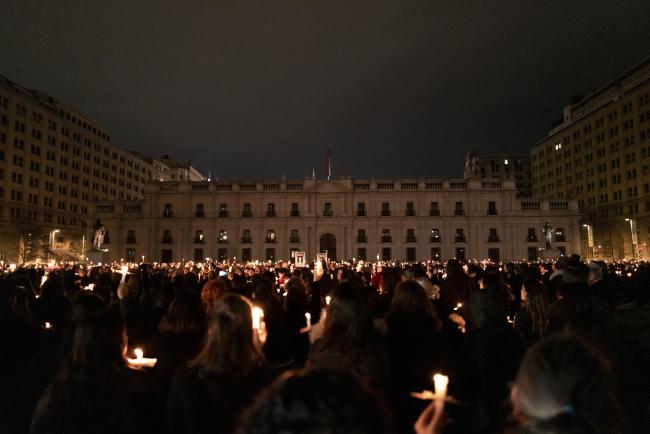
For psychologist Julio Quiroga, 34, negacionismo (denialism) is as harmful as it is present in Chile today. Standing next to Allende’s grave at the end of the march, he said that rather than seeing denialists being punished, as they are in some other countries, Chileans regularly read and hear denialist claims on a daily basis, sometimes even perpetuated by representatives of Congress.
Quiroga’s father and grandfather were military and marine men involved in the crimes of the dictatorship. He started to learn about that past when he was 14 years old. “My conscience and pain have grown since I realized what had happened,” he said. His partner’s uncle was disappeared during the dictatorship and her grandfather suffered torture.
“I can’t be complicit in that,” Quiroga said. “I have to work for reparations. It’s a responsibility towards those who are still here, but also those who aren’t here anymore. That’s why being here is meaningful.”
Lucía Cholakian Herrera is a freelance reporter from Buenos Aires covering politics and human rights in Latin America.
Anita Pouchard Serra is a French-Argentinian photojournalist and visual storyteller working around migrations, identities, territories, and memories. She is based in Buenos Aires and works between Latin America and France.

